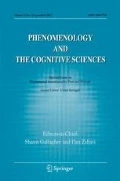Abstract
Emotion is traditionally described as a phenomenon that dominates the subject because one does not choose to be angry, sad, or happy. However, would it be totally absurd to conceive emotion as behaviour and a manifestation of the spontaneity and liberty of consciousness? In his short text, Esquisse d'une theorie des émotions, Sartre proposes a phenomenological description of this psychological phenomenon. He distinguishes between constituted affectivity, which gives rise to emotions, and an original affectivity lacking intentionality, and tied closely to bodily processes. It appears that emotion is first and foremost a magical attitude toward the world, an attitude freely adopted by the subject. Against what is often written, this thesis doesn't mean that emotion would be a pure comedy but only that, in spite of appearances, this behaviour isn't a matter of what Descartes calls soul's passions.
Similar content being viewed by others
References
Bergson, H. 1969. Les Deux Sources de la Morale et de la Religion. Paris: Presses Universitaires de France.
Bernet, R. 1994. La vie du Sujet. Recherches sur l'interprétation de Husserl dans la phenomenology. Paris: Presses Universitaires de France.
Buytendijk, F. J. J. 1987. The phenomenological approach to the problem of feelings and emotions. In: J. Kockelmans (ed), Phenomenological Psychology: The Dutch School, Dordrecht: Martinus Nijhoff.
de Bonis, M. 1976. Connaître les Emotions Humaines. Liège: Mardaga.
Descartes, R. 1963–1973. Lettre du 14 août 1649. In: F. Alquié (ed), Œuvres philosophiques. Paris: Garnier.
Freud, S. 1974. Introduction à laPsychanalyse. (Trans. S. Jankélévitch). Paris: Payot.
Freud, S. 1993. Inhibition, Symptôme et Angoisse. (Trans. J. Doron and R. Doron). Paris: PUF.
Freud, S. 1962. Trois Essais sur la Théorie de la Sexualité. (Trans. B. Reverchon-Jouve). Paris: Gallimard.
Heidegger, M. 1962. Being and Time. (Trans. J. Macquarrie and E. Robinson). New York: Harper and Row.
Husserl, E. 1970. Logical Investigations. (Trans. J. N. Findlay). New York: Humanities Press.
Husserl, E. 1991. Ideen zu einer reinen Phänomenologie und phänomenologischen Philosophie. Zweites Buch: Phänomenologische Untersuchungen zur Konstitution. Hrsg. von M. Biemel. Nachdruck.
Kant, I. 1978. Anthropology from a Pragmatic Point of View. (Trans. V. L. Dowdell. Revised by H. H. Rudnick). Carbondale, IL: Southern Illinois University Press.
Kraus, A. 1991. Modes d'existence des hystériques et des mélancoliques. In: P. Fédida and J. Schott (ed), Psychiatrie et Existence. Grenoble: Millon.
Laplanche, J. 1980. Problématique I, L'angoisse, Paris, Presses Universitaires de France.
Merleau-Ponty, M. 1966. Sens et non-sense. Paris: Gallimard. (English: Sense and Non-Sense. Trans. H. L. Dreyfus and P. A. Dreyfus). Evanston: Northwestern University Press, 1964.
Merleau-Ponty, M. 1945. Phénoménologie de la perception. Paris: Gallimard. (English: Phenomenology of Perception. Trans. Colin Smith). London: Routledge, 1962.
Pascal, B. 1963. Pensées. Oeuvres complètes, Paris: Seuil.
Pradines, M. 1943. Traité depsychologie générale, Vol. I, Le psychisme élémentaire. Paris: Presses Universitaires de France.
Ricoeur, P. 1950. Philosophie de la volonté, Vol. I, Le volontaire et l'involontaire. Paris: Aubier.
Sartre, J.-P. 1937. La Transcendance De l'ego. Paris: Vrin, 1988.
Sartre, J.-P. 1939. Une Idee Fondamentale de la Phénoménologie de Husserl: Intentionnalité. In Situations I. Paris: Gallimard.
Sartre, J.-P. 1940. L'imaginaire. Paris: Gallimard, 1986.
Sartre, J.-P. 1956. Being and Nothingness. (Trans. Hazel E. Barnes). New York: Washington Square Press.
Sartre, J.-P. 1965. Esquisse d'une theorie des emotions. Paris: Herman, 1965. (English: The Emotions: Outline of a Theory. Trans. B. Frechtman). New York: Philosophical Library, 1948.
Sartre, J.-P. 1983. Cahiers pour une Morale. Paris: Gallimard.
Scheler, M. 1973. Formalism in Ethics and Non-Formal Ethics of Values: A New Attempt toward the Foundation of an Ethical Personalism. (Trans. M. S. Frings and R. L. Funk). Evanston: Northwestern University Press.
Author information
Authors and Affiliations
Rights and permissions
About this article
Cite this article
Cabestan, P. What is it to move oneself emotionally? Emotion and affectivity according to Jean-Paul Sartre. Phenomenology and the Cognitive Sciences 3, 81–96 (2004). https://doi.org/10.1023/B:PHEN.0000041895.78486.e2
Issue Date:
DOI: https://doi.org/10.1023/B:PHEN.0000041895.78486.e2




